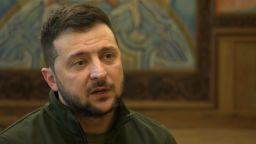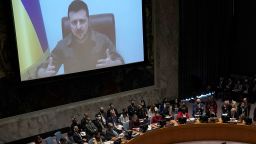Watching the brutal images of Russia’s invasion of Ukraine has many people around the world asking, why isn’t the United Nations doing more to stop the war? Among them, Ukrainian President Volodymyr Zelensky himself.
“You need to act immediately,” Zelensky implored the UN Security Council during a live-streamed address April 6 to its members.
He begged them to do something to stop the war in his country, criticizing the Security Council’s inaction directly. And he called out the elephant in the room: Russia, one of the five permanent members of the Council, whose status gives it the ability to veto any action it disagrees with.
“We are dealing with a state that turns the right of veto in the UN Security Council into a right to die,” Zelensky said.
It was a blunt message urging the Council to reform, and if that won’t work, he said, “the next option would be to dissolve yourself altogether. And I know you can admit that if there is nothing you can do besides conversation.”
Many people who have watched the UN for years agree that the UN Security Council looks impotent in this moment, with the world watching. The Security Council was designed in a different era, after World War II, with a membership and veto system that have ultimately restricted its effectiveness in dealing with this global conflict. Other parts of the UN have responded more effectively to the humanitarian and refugee crises the war has created.
FormerUS Ambassador to the UN John Bolton, who served under Republican Presidents including George W. Bush and Donald Trump, agreed with Zelensky’s assessment. “I thought he was absolutely right,” Bolton told CNN’s chief political analyst Gloria Borger. “And I thought one more convert to understanding what’s wrong with the United Nations. Its political institutions are fundamentally broken.”
Bolton has never been a big fan of the UN. He’s famous for saying, back in 1994, that if the UN Secretariat building in New York “lost 10 stories, it wouldn’t make a bit of difference.”
There have been many moments of deadlock before in the Security Council when the big powers disagree. But this moment has drawn outsized attention globally.
“This is the single biggest crisis to hit the UN since the end of the Cold War,” said Richard Gowan, the UN Director for the International Crisis Group. “It is possible that this does mark the beginning of a sort of fundamental rupture amongst the great powers that will make UN diplomacy see vastly harder going forward.”
The system was designed this way: to prevent global conflict but also to reward the main winners of World War II, according to Gowan.
Key veto power
When the United Nations charter was signed in 1945, it established the Security Council with five permanent members and six nonpermanent members. The permanent members – the US, the UK, France, the Soviet Union, and the Republic of China – were each given the power to veto any resolutions they opposed.
“It was Franklin Roosevelt who wanted to set up an organization that would police the world after the defeat of Nazi Germany,” Gowan said. “But the only way he could get Russia and other powers to agree to that deal, was if they had the ability to block any actions against themselves.”
The late Soviet Union leader Joseph Stalin himself insisted on that power as a way for his state to protect itself.
Today, the Security Council has 15 members, but the five permanent members have remained the same, with Russia holding the former Soviet Union’s seat and China taking the seat of the Republic of China. And the veto hasn’t changed either.
“What we’re seeing is, when there’s a fundamental disagreement among the permanent members, nothing happens,” Bolton said.
The UN charter also makes it impossible to do another thing Zelensky suggested: kick Russia off the Security Council, because the country can veto that too.
Over the years, countries and diplomats have suggested to reform the council by adding more permanent members to make it better reflect the contemporary geopolitical reality, or even try to take away the veto power. But no country wants to dilute its power.
“I’m being honest with you, I don’t think anyone’s going to want to give up their veto,” former US Ambassador to the UN Bill Richardson, who served under former Democratic President Bill Clinton, told Borger.
Richardson points out that the United States has used the veto to protect its own interests – and may need to again.
“It helped us in the Iraq War. It helped us in Bosnia. It helps us in conflicts in Africa,” he said. “So no country that is a permanent member wants to give up their veto. And I would be against the US giving up their veto right now, just so that we take action on another issue.”
In theory, the Security Council “could impose even more sweeping global economic sanctions on Moscow than we have already seen. It could technically authorize military action to push back Russian forces in Ukraine,” according to Gowan.
But with Russia and likely China set to veto any action taken against the war, the Security Council is deadlocked.
A massive global organization
The UN is bigger than just the Security Council, and other areas of the body – which has six main organs – have been more active since Russia invaded Ukraine.
“The UN is for airing publicly the tragedies of the world. Like the refugee crisis in Ukraine, like the possible war crimes, like so many other human costs that are taking place,” Richardson said. “At the same time, the UN is providing food. The UN is providing refugee assistance.”
The UN General Assembly has condemned Russia twice over the war in Ukraine; those resolutions are nonbinding but carry symbolic weight. Russia was also suspended from the Human Rights Council, which requires a two-thirds vote.
But Bolton said the math behind that vote shows Russia has significant support around the world; the voting result was 93 in favor, 24 against and 58 abstentions. A remaining 18 member states were not included in that result.
“So here’s the real headline … A majority of the members of the United Nations, did not vote to expel Russia,” he told Borger.
Russian President Vladimir Putin likely expected these kinds of condemnations, but what he really cares about is the status and power that being on the Security Council gives Russia.
“After the collapse of the Soviet Union, Moscow clung on to its seat in the Security Council essentially as proof that it was still a big power,” Gowan of the International Crisis Group said. “Now, in the real world … Russia is not that important. It’s China and the US that are the dominant players, but in the Security Council, the Russians stand as equal to the US. And they’re very, very proud of having that status.”
And Richardson knows firsthand from his time at the UN in the 1990s, Russia knows how to play the system.
“When I became UN ambassador for the US, Lavrov, Foreign Minister had been there 10 years already. So he was very skillful,” Richardson said. “He knew how to maneuver in the Security Council. He was very formidable. And so we have Russia right now, very knowledgeable about UN operations so that’s an advantage that they have.”
And so the Security Council could only watch as Russia invaded Ukraine. And in a bizarre split-screen moment, Russia held the rotating presidency of the Security Council and even chaired the meeting as the invasion began and diplomacy failed.
Bolton doesn’t see any way to change the system.
“Unless unicorns break free and sweetness and light prevails, where there are disagreements among the (permanent) five, there will be no action,” he said.





